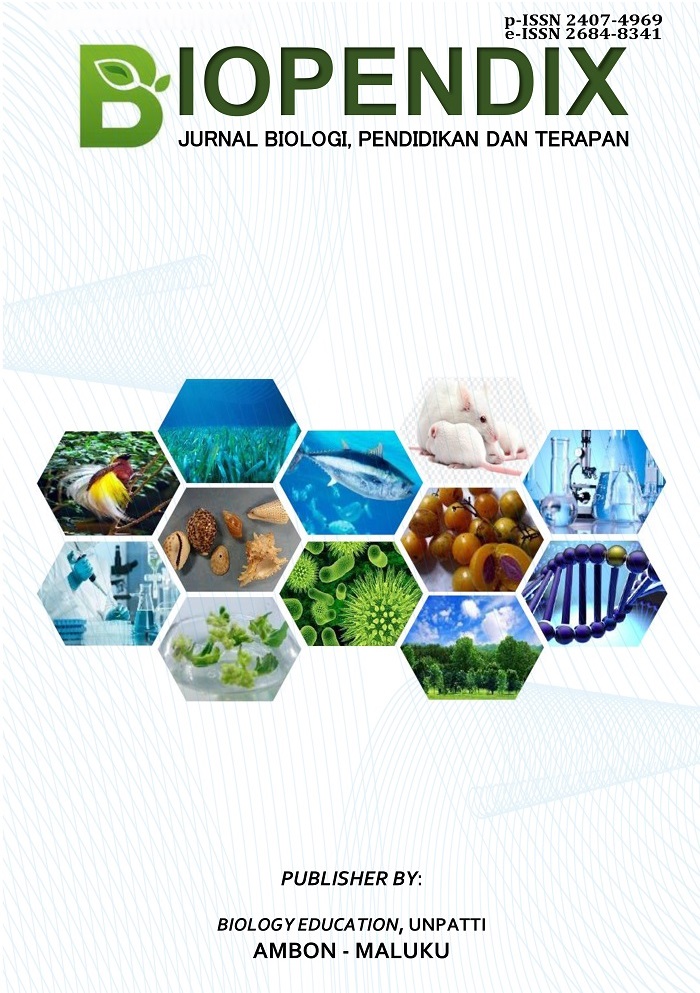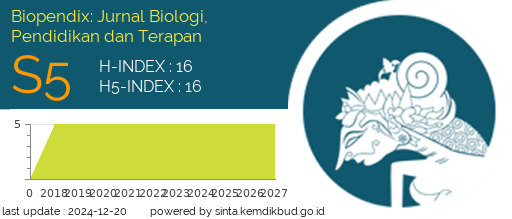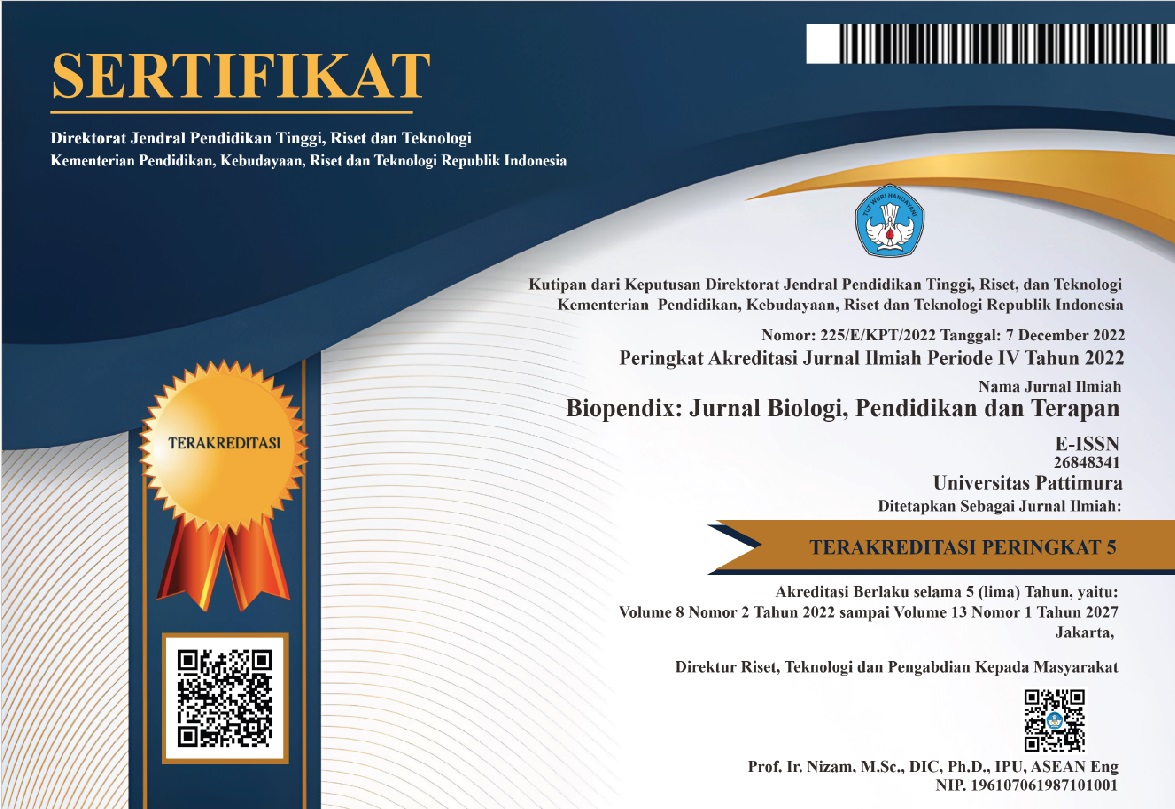Spatial Analysis of the Impact of Nickel Mining on Vegetation Cover Change in Obi Island, Indonesia
Abstract
The nickel mining activities in Indonesia, particularly on Obi Island, have significantly altered land-use patterns, marked by an expansion of bare land due to topsoil and vegetation removal. This has led to a drastic decline in dense and productive vegetation cover, which previously served as a carbon sink and habitat for local biodiversity. Utilizing Landsat 8 Surface Reflectance Collection 2 Tier 1 imagery (2015, 2020, 2025), this study employed the Normalized Difference Vegetation Index (NDVI) within the Google Earth Engine and ArcGIS Pro platforms to assess spatiotemporal changes in vegetation cover. Results indicate a substantial increase in non-vegetated areas and a significant reduction in moderate-to-high-density vegetation, particularly within the mining core zone, directly attributable to nickel extraction activities, which drive habitat fragmentation and ecosystem degradation. Although rehabilitation and revegetation efforts demonstrate localized success, ongoing mining pressures pose risks of further environmental damage without sustainable management. This study underscores the critical need for stringent environmental regulations and targets ecological restoration to mitigate mining impacts and ensure the long-term sustainability of Obi Island's ecosystems
Downloads
References
Adidharma, M. A., Supriatna, S., & Takarina, N. D. (2023). The impact of nickel mining on vegetation index in Molawe Sub-district, North Konawe District, Southeast Sulawesi, Indonesia. Biodiversitas Journal of Biological Diversity, 24(8). https://doi.org/10.13057/biodiv/d240840
Adrian Mulya, Yuli Z., Rabul Sawal, Anne Parisianne. (2024). Nickel mining’s toll on Indonesia’s small islands: stories of resistance and survival. RECCESSARY. https://doi.org/Nickel mining’s toll on Indonesia’s small islands: stories of resistance and survival
Aires, U. R. V., da Silva, D. D., Moreira, M. C., Ribeiro, C. A. A. S., & Ribeiro, C. B. de M. (2020). The Use of the Normalized Difference Vegetation Index to Analyze the Influence of Vegetation Cover Changes on the Streamflow in the Manhuaçu River Basin, Brazil. Water Resources Management, 34(6), 1933–1949. https://doi.org/10.1007/s11269-020-02536-1
Aryal, J., Sitaula, C., & Aryal, S. (2022). NDVI Threshold-Based Urban Green Space Mapping from Sentinel-2A at the Local Governmental Area (LGA) Level of Victoria, Australia. Land, 11(3), 351. https://doi.org/10.3390/land11030351
Blanche, M. F., Dairou, A. A., Juscar, N., Romarice, O. M. F., Arsene, M., Bernard, T. L., & Leroy, M. N. L. (2024). Assessment of land cover degradation due to mining activities using remote sensing and digital photogrammetry. Environmental Systems Research, 13(1), 41. https://doi.org/10.1186/s40068-024-00372-5
Brown, C., Boyd, D. S., & Kara, S. (2022). Landscape Analysis of Cobalt Mining Activities from 2009 to 2021 Using Very High Resolution Satellite Data (Democratic Republic of the Congo). Sustainability, 14(15), 9545. https://doi.org/10.3390/su14159545
Chang, X., Zhang, F., Cong, K., & Liu, X. (2021). Scenario simulation of land use and land cover change in mining area. Scientific Reports, 11(1), 12910. https://doi.org/10.1038/s41598-021-92299-5
Chen, Z. (2025). Remote Sensing Monitoring of Ecological Environment Change in Jinchuan Mining Area, China. Journal of Environmental Protection, 16(03), 211–224. https://doi.org/10.4236/jep.2025.163010
Gorelick, N., Hancher, M., Dixon, M., Ilyushchenko, S., Thau, D., & Moore, R. (2017). Google Earth Engine: Planetary-scale geospatial analysis for everyone. Remote Sensing of Environment, 202, 18–27. https://doi.org/10.1016/j.rse.2017.06.031
Gultom, T., Nugraha, D., Sugiyarno, & Iqbal, M. (2023). Contribution of Obi Island Reducing the Carbon Footprint in the Transport Sector. IOP Conference Series: Earth and Environmental Science, 1175(1), 012015. https://doi.org/10.1088/1755-1315/1175/1/012015
Guo, Y., Huang, Y., Li, J., Ouyang, S., Wu, L., & Qi, W. (2023). Study on the influence of mining disturbance on the variation characteristics of vegetation index: A case study of Lingwu Mining Area. Environmental Development, 45, 100811. https://doi.org/10.1016/j.envdev.2023.100811
Heijlen, W., & Duhayon, C. (2024). An empirical estimate of the land footprint of nickel from laterite mining in Indonesia. The Extractive Industries and Society, 17, 101421. https://doi.org/10.1016/j.exis.2024.101421
Hu, J., Ye, B., Bai, Z., & Feng, Y. (2022). Remote Sensing Monitoring of Vegetation Reclamation in the Antaibao Open-Pit Mine. Remote Sensing, 14(22), 5634. https://doi.org/10.3390/rs14225634
Levická, J., & Orliková, M. (2024). The Toxic Legacy of Nickel Production and Its Impact on Environmental Health: A Case Study. International Journal of Environmental Research and Public Health, 21(12), 1641. https://doi.org/10.3390/ijerph21121641
Lim, S. L., Sreevalsan‐Nair, J., & Daya Sagar, B. S. (2024). Multispectral data mining: A focus on remote sensing satellite images. WIREs Data Mining and Knowledge Discovery, 14(2). https://doi.org/10.1002/widm.1522
Onisimo Muntaga, L. K. (2019). Google Earth Engine Applications. Remotesensing, 11–14. https://doi.org/10.3390/rs11050591
Orimoloye, I. R., & Ololade, O. O. (2020). Spatial evaluation of land-use dynamics in gold mining area using remote sensing and GIS technology. International Journal of Environmental Science and Technology, 17(11), 4465–4480. https://doi.org/10.1007/s13762-020-02789-8
Osei, B. K., Ahenkorah, I., Ewusi, A., & Fiadonu, E. B. (2021). Assessment of flood prone zones in the Tarkwa mining area of Ghana using a GIS-based approach. Environmental Challenges, 3, 100028. https://doi.org/10.1016/j.envc.2021.100028
Pacheco, A. da P., Nascimento, J. A. S. do, Ruiz-Armenteros, A. M., da Silva Junior, U. J., Junior, J. A. da S., de Oliveira, L. M. M., Melo dos Santos, S., Filho, F. D. R., & Pessoa Mello Galdino, C. A. (2025). Land Cover Transformations in Mining-Influenced Areas Using PlanetScope Imagery, Spectral Indices, and Machine Learning: A Case Study in the Hinterlands de Pernambuco, Brazil. Land, 14(2), 325. https://doi.org/10.3390/land14020325
Rakuasa, H., & Budnikov, V. V. (2025). Spatial Analysis of Vegetation Density Using MSARVI Algorithm and Sentinel-2A Imagery in Ternate City, Indonesia. Journal of Engineering and Science Application, 2(1), 36–41. https://doi.org/10.69693/jesa.v2i1.14
Rakuasa, H., Khromykh, V. V, & Latue, P. C. (2025). Spatial Analysis of the Relationship between Vegetation Index and Land Surface Temperature in Ternate Island, Indonesia. BIOPENDIX: Jurnal Biologi, Pendidikan Dan Terapan, 12(1), 48–57. https://doi.org/10.30598/biopendixvol12issue1page48-57
Rakuasa, H., & Sihasale, D. A. (2023). Analysis of Vegetation Index in Ambon City Using Sentinel-2 Satellite Image Data with Normalized Difference Vegetation Index (NDVI) Method based on Google Earth Engine. Journal of Innovation Information Technology and Application (JINITA), 5(1), 74–82. https://doi.org/10.35970/jinita.v5i1.1869
Salakory, M., Rakuasa, H. (2022). Modeling of Cellular Automata Markov Chain for predicting the carrying capacity of Ambon City. Jurnal Pengelolaan Sumberdaya Alam Dan Lingkungan (JPSL), 12(2), 372–387. https://doi.org/10.29244/jpsl.12.2.372-387
Satyawan, I. A., Pardede, T. M., & Kevin, M. S. (2023). Nickel mining in Obi Island: problem or solution for mitigating climate change effects? E3S Web of Conferences, 467, 02005. https://doi.org/10.1051/e3sconf/202346702005
Tela, I. A., & Yu, Z. (2025). Examining the Global Perception of Nickel Mining Environmental Impact: A Case Study of China-Indonesia Public Opinion on Earth’s Sustainability (pp. 22–42). https://doi.org/10.2991/978-94-6463-646-8_3
Wu, C., Zhang, Y., Zhang, J., Chen, Y., Duan, C., Qi, J., Cheng, Z., & Pan, Z. (2022). Comprehensive Evaluation of the Eco-Geological Environment in the Concentrated Mining Area of Mineral Resources. Sustainability, 14(11), 6808. https://doi.org/10.3390/su14116808
Yang, C. H., Stemmler, C., & Müterthies, A. (2023). Ground Movement Analysis In Post-Mining City Using Mtinsar With Help Of European Ground Motion Service. ISPRS Annals of the Photogrammetry, Remote Sensing and Spatial Information Sciences, X-1/W1-202, 739–745. https://doi.org/10.5194/isprs-annals-X-1-W1-2023-739-2023
Yang, Z., Shen, Y., Li, J., Jiang, H., & Zhao, L. (2022). Unsupervised monitoring of vegetation in a surface coal mining region based on NDVI time series. Environmental Science and Pollution Research, 29(18), 26539–26548. https://doi.org/10.1007/s11356-021-17696-9
Copyright (c) 2025 Heinrich Rakuasa, Vadim V Khromykh, Philia Christi Latue, Ahmad Rifai

This work is licensed under a Creative Commons Attribution-ShareAlike 4.0 International License.
Authors who publish with this Journal agree to the following terms:
- Author retain copyright and grant the journal right of first publication with the work simultaneously licensed under a creative commons attribution license that allow others to share the work within an acknowledgement of the work’s authorship and initial publication of this journal.
- Authors are able to enter into separate, additional contractual arrangement for the non-exclusive distribution of the journal’s published version of the work (e.g. acknowledgement of its initial publication in this journal).
- Authors are permitted and encouraged to post their work online (e.g. in institutional repositories or on their websites) prior to and during the submission process, as it can lead to productive exchanges, as well as earlier and greater citation of published works





 2
2






